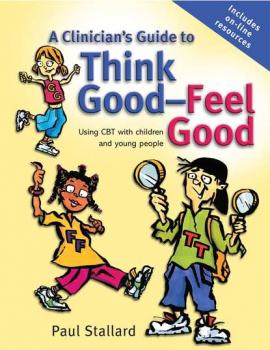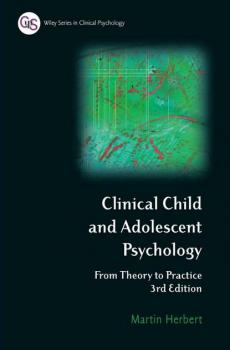Общая психология
Различные книги в жанре Общая психологияA Clinician's Guide to Think Good-Feel Good
This is a companion guide to Think Good Feel Good: A Cognitive Behaviour Therapy Workbook for Children and Young People. Designed for clinicians using the original workbook in their work with children, the book builds upon the workbook materials by offering guidance on all aspects of the therapeutic process and a range of case studies highlighting therapy in action. Topics covered include parent involvement, key cognitive distortions in children, formulations, challenging thoughts, guided discovery and the use of imagery. Also included is a chapter focusing on possible problems in therapy and strategies for overcoming them. To supplement the workbook, the clinician's guide offers further materials and handouts for use in therapy, including psycho-educational materials for children and parents on common problems, such as depression, OCD, PTSD/Trauma and Anxiety
International Handbook of Applied Research in Intellectual Disabilities
The landmark International Handbook of Applied Research in Intellectual Disabilities presents, explains, and illustrates key methods of research and evaluation of proven relevance and value to the field of intellectual disabilities. It features sections on the concepts and theoretical models underlying research and evaluation, the methods and techniques themselves, and the key application areas where the methods are demonstrated in action. Coverage includes applications in educational, social, family, health, and employment aspects of care and provision for those with intellectual disabilities.
Psychological Interventions in Early Psychosis
Psychological Interventions in Early Psychosis provides a comprehensive overview of the emerging research and clinical evidence base for psychological treatments across the phases of early psychosis. Beginning with identified at-risk young people, the text continues through to those in acute and recovery phases, to the needs of patients with persistent symptoms. This practical treatment handbook: draws upon the expertise of several internationally recognised clinical and research programs integrates reviews of the relevant research literature with illustrative case examples covers critical issues for the clinician in focal chapters on suicide prevention, comorbid cannabis abuse, and family work describes several modalities of treatment, such as multi-family psychoeducation, group work, psychodynamic and cognitive behavioural approaches. Specialist early psychosis services are developing rapidly worldwide. Psychological Interventions in Early Psychosis will be an essential resource for clinicians and service leaders alike.
Managing Children's Disruptive Behaviour
Managing Children's Disruptive Behavior is a comprehensive guide designed for professionals and parents who care for children whose behavior problems are beyond those encountered normally. Arranged in three parts, the book opens by setting out the theoretical background to conduct disorders in a range of settings. Part Two discusses issues in assessment and treatment and explains the background to the 'Child-Wise' programs devised by the authors. Four versions of the Child-Wise program follow, complete with useful materials for evaluation and homework purposes. This flexible set of resources has been designed for use with children aged between 2 and 10 years and includes versions for use: in group settings; at home; in the classroom; with typical and special needs children. Devised for use by a wide range of professionals, the programmes reduce fraught interactions and restore mutually enjoyable relationships between the carer/parent and the child. There are also further resources available to download from a supporting website. Managing Children's Disruptive Behaviour is an invaluab le tool for psychologists, health visitors, social workers, teachers, and all those whose work involves children and their carers.
Counseling and Psychotherapy with Children and Adolescents
A comprehensive, theory-based approach to working with young clients in both school and clinical settings Counseling and Psychotherapy with Children and Adolescents, Fifth Edition provides mental health professionals and students with state-of-the-art theory and practical guidance for major contemporary psychotherapeutic schools of thought. Children and adolescents are not just small adults; they have their own needs, requirements, and desires, on top of the issues presented by still-developing brains and limited life perspective. Providing care for young clients requires a deep understanding of the interventions and approaches that work alongside growing brains, and the practical skill to change course to align with evolving personalities. The thoroughly revised fifth edition is a comprehensive reference, complete with expert insight. Organized around theory, this book covers both clinical and school settings in the fields of psychology, counseling, and social work. Coverage of the latest thinking and practice includes Cognitive Behavioral, Rational-Emotive, Reality Therapy, Solution Focused, Family Systems, and Play Therapy, providing a complete resource for any mental health expert who works with young people. Understand the major approaches to counseling and psychotherapeutic interventions Discover the ethical and legal implications of working with children and adolescents Learn how to employ culturally responsive counseling with younger clients Examine interventions for children and adolescents with disabilities and health care needs This updated edition includes a stronger emphasis on the clinical application of theory to specific disorders of childhood and adolescence, and new coverage of the legal and ethical issues related to social media. Chapters include a case studies and online resources that make it ideal for classroom use, and new chapters on Solution-Focused Therapy and Play Therapy enhance usefulness to practicing therapists. Expert guidance covers techniques for working with individuals, groups, and parents, and explores the efficacy of the theories under discussion.
California School of Professional Psychology Handbook of Juvenile Forensic Psychology
The Handbook of Juvenile Forensic Psychology is a comprehensive handbook for mental health professionals working with juveniles in the criminal justice system and in family and dependency courts. Written by a panel of experts in the field, the book focuses on the proactive prevention, accurate evaluation, and progressive treatment for delinquent juveniles and for juveniles caught in the web of a contentious divorce or in the foster care system.
Depression in Children and Adolescents
This book, which draws together contributions from specialists in child, adolescent and family psychiatry, child psychotherapy, social work, community psychiatric nursing, educational therapy, special needs coordination in teaching, and general practice, provides a valuable resource for those professionals in contact with young people suffering from depression.
Brain-Based Therapy with Children and Adolescents
Designed for mental health professionals treating children and adolescents, Brain-Based Therapy with Children and Adolescents: Evidence-Based Treatment for Everyday Practice is a simple but powerful primer for understanding and successfully implementing the most critical elements of neuroscience into an evidence-based mental health practice. Written for counselors, social workers, psychologists, and graduate students, this new treatment approach focuses on the most common disorders facing children and adolescents, taking into account the uniqueness of each client, while preserving the requirements of standardized care under evidence-based practice.
Clinical Child and Adolescent Psychology
Theoretical and practice-oriented,Clinical Child and Adolescent Psychology offers a concise, comprehensive, review of the knowledge, concepts and practice of child and adolescent clinical psychology. This fully revised and updated edition of ‘Clinical Child Psychology ’, now incorporates a fuller account of the range of clinical problems of adolescence, together with an expanded account of the major developmental and psychosocial disorders, such as autism, ADHD, and conduct disorder. Each chapter considers a different category of problem or disorder, and covers issues of diagnosis, clinical and developmental features, causes, interventions and outcomes. Now covers adolescence as well as childhood Updated coverage of major developmental disorders Included in the Wiley Series in Clinical Psychology
Blackwell Handbook of Infant Development
This up-to-date overview of the fast-moving field of infant development covers all the major areas of interest in terms of research, applications and policy. Provides an up-to-date overview of progress on important developmental questions relating to infancy. Balances North American and European perspective. Written by leading international researchers. Now available in full text online via xreferplus, the award-winning reference library on the web from xrefer. For more information, visit www.xreferplus.com









